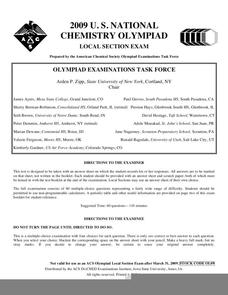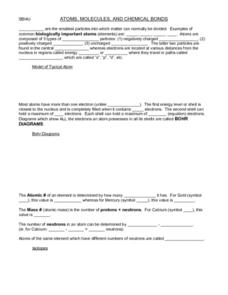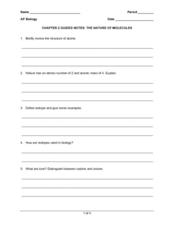National Institute of Open Schooling
Periodic Table and Atomic Properties
An in-depth lesson, the fourth activity in a series of 36, begins with teaching how the periodic table's arrangement came to its current design. Using this knowledge, pupils then move on to analyze the arrangement of elements to their...
Curated OER
Elements and Bonding Worksheet
In this elements and bonding worksheet, students classify given elements, they identify valence electrons in atoms, they explain the reactivity of elements, and they explain why certain atoms gain electrons while others lose electrons.
Curated OER
More Chemical Bonding
In this chemical bonding learning exercise, students review the three types of compounds: ionic, covalent, and polyatomic. Students practice drawing the covalent bonds of given compounds. This learning exercise has 5 drawings and 13 fill...
Curated OER
More Chemical Bonding
For this chemical bonding worksheet, learners review the three types of bonds including ionic, covalent and polyatomic compounds. They identify 8 compounds as ionic, covalent or polyatomic and they make 4 ionic compounds and they draw 5...
Curated OER
Periods and Groups; Valence Electrons; Masses
In this elements instructional activity, students read how the elements are organized in periods and groups in the periodic table. Students use the periodic table to find the valence electrons and calculate molecular mass. This...
Curated OER
Honors: Drawing Lewis Structures Homework
In this Lewis structures worksheet, students draw 12 Lewis dot structures for 8 compounds and 4 polyatomic ions using electrons in the outer orbitals to show bonding.
Curated OER
2007 U.S. National Chemistry Olympiad Local Section Exam
Sixty multiple choice questions cover the entire gamut of chemistry concepts. This is the local section of the U.S. National Chemistry Olympiad, where your chemistry candidates take a shot at entering the national competition. They...
Curated OER
2000 U.S. National Chemistry Olympiad Local Section Exam
This 60-question comprehensive exam was designed to determine who would go on to compete in the 2000 US National Chemistry Olympiad. Hopefuls answer multiple choice questions regarding all chemistry topics taught in the first year...
Curated OER
2000 U.S. National Chemistry Olympiad National Exam - Part I
The National Chemistry Olympiad exams are comprehensive tests covering an entire year of chemistry concepts. You can use them as practice for competing in the challenge, or simply as a review, or as an actual final exam for your...
Curated OER
2009 U. S. National Chemistry Olympiad - Local Section Exam
Here is a copy of a past national challenge exam that you can use in your general chemistry course as a unit or semester review. Sixty multiple-choice questions query learners on properties of matter, stoichiometry, reactions, and...
Curated OER
Covalent Bonding-Electron Dot Structures
In this chemistry, students draw the Lewis structures of 20 covalent compounds. They demonstrate how the lone pairs are distributed in the molecule.
Curated OER
Creating Bonds
In this creating bonds instructional activity, students create 2-D and 3-D models of the molecular formula provided. Students complete a chart of information about the molecular formula given.
Curated OER
Atoms, Molecules, and Chemical Bonds
In this atoms worksheet, students review the parts of an atom, Bohr diagram, atomic number, mass number, and covalent bonds. This worksheet has 5 drawings and 26 fill in the blank questions.
Curated OER
The Building Blocks
This PowerPoint is a comprehensive review of all the facts related to an atom's basic structure and function. What makes this unique is that it is geared toward an audience of junior geologists. After introducing the periodic table of...
Curated OER
Chemical Context of Life & Water
Some basic chemistry concepts are fundamental to understanding biology. Learners explore how molecular structure plays a role in biological processes, especially the structure of the water molecule. The final page focuses on water's...
Curated OER
The Nature of Molecules
Even though the questions on this worksheet pertain to general chemistry, it was created for an AP biology course. It is crucial for biology learners to grasp these concepts as a foundation for biochemical processes that they will...
Curated OER
2005 U.S. National Chemistry Olympiad - Local Section Exam
National Chemistry Olympiad tests are released after their use each year, since they cannot use them again for this event. The result: outstanding comprehensive assessment resources for general chemistry classes! This 2005 version covers...
Curated OER
Organic Chemistry 231, Martin Larter, Exam 1
If you need a straightforward and comprehensive organic chemistry exam, check this one out. Chemistry pupils identify functional groups in molecule diagrams, draw a Lewis structure, fill in a table about molecular shape, predict boiling...
Pearson
The Chemical Context of Life
An educational presentation includes atoms, molecules, the four major elements, as well as neutrons and protons. Additionally, slides focus on atomic number, mass number, atomic weight, polar and nonpolar covalent bonding, ionic...
Royal Society of Chemistry
Shapes of Molecules—Geometry of Central Atom
How is a molecule's shape determined? Explore bond angles, lone pairs, and VSEPR theory through a logic-based activity. Chemists pull together information about the major molecular shapes, then use it to solve puzzles.
Royal Society of Chemistry
Shapes of Molecules—Distortion from the Pure Geometry
Ready to introduce the realities of molecular geometry to chemistry pupils? Use a logic-based interactive! Perfect as individual practice, the puzzles explore the bond angles and repulsions present in three common molecular shapes.
Royal Society of Chemistry
Shapes of Molecules—Hybrid Orbitals
Take your chemistry class' knowledge of molecular geometry to the next level! Introduce orbital hybridization with a series of related games. Individuals complete a data table in the first activity, then solve Sudoku-like puzzles using...
Curated OER
Gumdrop Crystal Models
A great way to learn about molecular structures is to make a model. Gumdrops and toothpicks are used to construct crystal models. The models are based on theories of crystal shapes that occur because of positive and or negatively charged...
National Institute of Open Schooling
General Characteristics of the p-Block Elements
The 20th installment in a series of 36 focuses on the characteristics of the p-block elements. Learners discuss, read about, and answer questions pertaining to the occurrence of these elements in nature, their electron configurations,...























